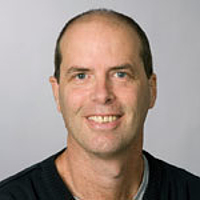Ari Waisman
Development and Regulation of IL-17 Producing Cells During Inflammation

The immune system has evolved to protect mammals from environmental stress factors such as pathogens. It functions as a fine-tuned consortium of effector units and suppressors. However, under certain pathologic conditions effector units may escape control and start to attack their own body. This leads to the development of autoimmune diseases, such as multiple sclerosis (MS). We use molecular and genetic tools such as Cre-recombinase and Cre/loxP, microscopy, next generation sequencing (including single cell sequencing and ATAC-seq), proteomics, and high dimensional flow cytometry to study the cellular and molecular mechanisms of MS pathology.
The lab is also interested in studying the role of the deubiquitinating (DUB) enzymes A20 and CYLD in the ageing process. To this end, we study how deletion of these DUB enzymes specifically in glia cells affects the ageing of the brain.
Positions held
- Since 2011: W3 Univ. Prof. and Director, Institute for Molecular Medicine, University Medical Center (UMC), Mainz
- 2010 - 2011: Acting Director, Institute for Molecular Medicine, University Medical Center (UMC), Mainz
- 2005 - 2010: W2 Univ. Prof. in the I. Medical Department, University Medical Center (UMC), Mainz
- 2001 - 2005: Independent Group Leader, Laboratory for Molecular Immunology, Institute for Genetics, University of Cologne
- 2000 - 2001: Research Associate, Department of Immunology, Institute for Genetics, University of Cologne
- 1996 - 2000: Postdoctoral fellow, Department of Immunology, Institute for Genetics, University of Cologne
- 1994 - 1996: Postdoctoral fellow, Department of Immunology, The Weizmann Institute of Science, Rehovot
Education
- 1986 - 1990: PhD, The Weizmann Institute of Science, Rehovot, Israel
- 1986 - 1988: MSc, The Weizmann Institute of Science, Rehovot, Israel
- 1983 - 1986: BSc in Life Sciences, Tel-Aviv University, Israel
Selected publications by Ari Waisman
Regen T, Isaac S, De Oliveira Amorim A, Gonzalo Núñez N, Hauptmann J, Shanmugavadivu A, Klein M, Sankowski R, Mufazalov IA, Yogev N, Huppert J, Wanke F, Witting M, Grill A, Galvez EJC, Nikolaev A, Blanfeld M, Prinz I, Schmitt-Kopplin P, Strowig T, Reinhardt C, Prinz M, Bopp T, Becher B, Ubeda C and Waisman A (2021) IL-17 controls the central nervous system autoimmunity through the intestinal microbiome. Science Immunology, 6:eaaz6563 Link
Hauptmann J, Johann L, Marini F, Kitic M, Colombo E, Mufazalov IA, Krueger M, Karram K, Moos S, Wanke F, Kurschus FC, Klein M, Cardoso S, Strauß J, Bolisetty S, Lühder F, Schwaninger M, Binder H, Bechman I, Bopp T, Agarwal A, Soares MP, Regen T and Waisman A (2020) Interleukin-1 promotes autoimmune neuroinflammation by suppressing endothelial heme oxygenase-1 at the blood-brain barrier. Acta Neuropathol, 140:549-567 Link
Heink S, Yogev N, Garbers C, Herwerth M, Aly L, Gasperi C, Husterer V, Croxford AL, Möller-Hackbarth K, Bartsch HS, Sotlar K, Krebs S, Regen T, Blum H, Hemmer B, Misgeld T, Wunderlich FT, Hidalgo J, Oukka M, Rose-John S, Schmidt-Supprian M, Waisman A* and Korn T* (2017) Trans-presentation of IL-6 by dentritic cells is required for the priming of pathogenic TH17 cells. Nat Immunol, 18:74-85 (*indicates joint contribution) Link
Bruttger J, Karram K, Wörtge S, Regen T, Marini F, Hoppmann N, Klein M, Blank T, Yona S, Wolf Y, Mack M, Pinteaux E, Müller W, Zipp F, Binder H, Bopp T, Prinz M, Jung S and Waisman A (2015) Genetic cell ablation reveals clusters of local self-renewing microglia in the mammalian central nervous system. Immunity, 43:92-106 Link
Yogev N, Frommer F, Lukas D, Kautz-Neu K, Karram K, Ielo D, von Stebut E, Probst HC, van den Broek M, Riethmacher D, Birnberg T, Blank T, Reizis B, Korn T, Wiendl H, Jung S, Prinz M, Kurschus FC and Waisman A (2012) Dentritic cells ameliorate autoimmunity in the CNS by controlling the homeostasis of PD-1 receptor(+) regulatory T cells. Immunity, 37:264-75 Link
